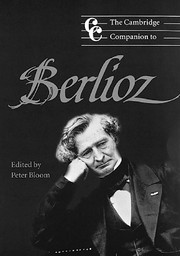1 - Berlioz as man and thinker
from Part I - Perspectives
Published online by Cambridge University Press: 28 September 2011
Summary
It has been well said that the pervasive elegance in the music of Berlioz is a reflection of his cultivated mind. Genius, it is true, can create masterpieces without the aid of intellect and general culture. But their presence does no harm; they develop that second-level simplicity which, when allied to conciseness, yields elegance. In every art one can distinguish those masters who have been men of thought from those in whom native gift has reigned alone. Turner and Daumier in painting, Schubert and Brahms in music come to mind as projecting the artistic power in its first simplicity. That characteristic implies no limitation of sensibility or technique.
The other category – take for examples Delacroix and Schumann – is the one to which Berlioz belongs. His uncommon upbringing ensured that he would have the self-awareness and detachment of the highly literate. It proved a source of imaginative richness in his music and of spiritual distress in his life.
As he makes a point of telling us in his Mémoires, Berlioz was reared in the Holy Apostolic Roman Catholic Church. His mother was a believer, his father an eighteenth-century “encyclopedist”; that is to say a man of advanced ideas, for whom religion had a much attenuated meaning. As a physician he rejoiced in the progress of science and passed on to his son his own broad curiosity about it. Scientific method implied an a priori rejection of the supernatural and a steady skepticism.
- Type
- Chapter
- Information
- The Cambridge Companion to Berlioz , pp. 9 - 19Publisher: Cambridge University PressPrint publication year: 2000

